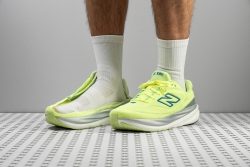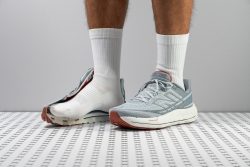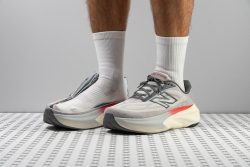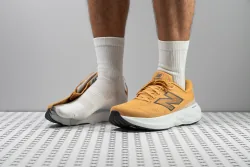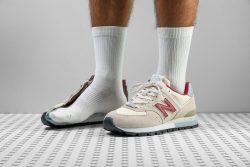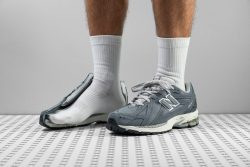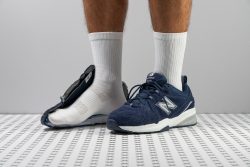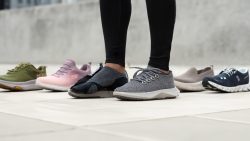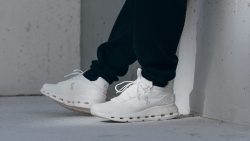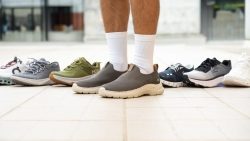7 Best New Balance Walking Shoes in 2025
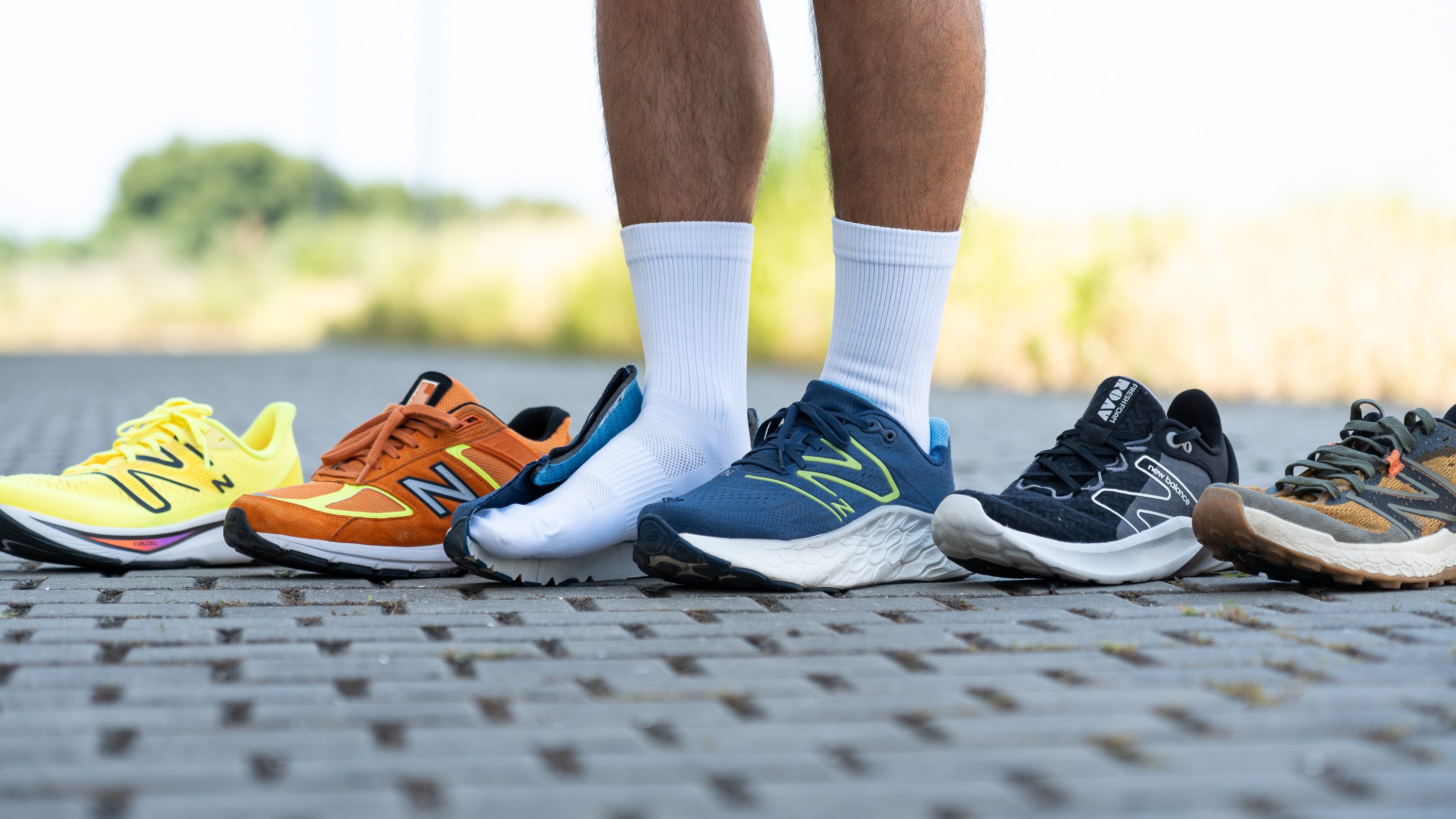
We buy shoes ourselves. We earn commissions when you buy through us, at no extra cost. Why trust us
New Balance walking shoes are meant to keep you comfortable for long hours of walking and standing. Be it day-to-day chores, work, or traveling, the primary focus of these shoes is to keep you fatigue-free.
The brand’s extensive experience in arch support and cushioning technologies makes it some of the best options for all-day support and comfort. And we are here to select the creme de la crop among New Balance walking shoes in various categories.
How we test New Balance walking shoes
In selecting the shoes to test, we do not only concentrate on the popular ones but also give the little-known NB models equal priority to keep the competition fair. To give you an idea of how we keep our reviews as thorough as possible, here's what we do:
- We buy all the NB shoes, whether they're popular or not, expensive or cheap, using the money out of our own wallets. We do not depend on anyone but ourselves to obtain each pair to stay unclouded with our judgments.
- We feel the NB shoes with our feet. We bring them on daily walks, work, and other outdoor trips.
- We tear apart the NB shoes to see what's inside. We also test each pair in our lab and measure the weight of the shoe, shock absorption, breathability, heel counter stiffness, traction, and other features relevant to walking.
Best New Balance walking shoes overall
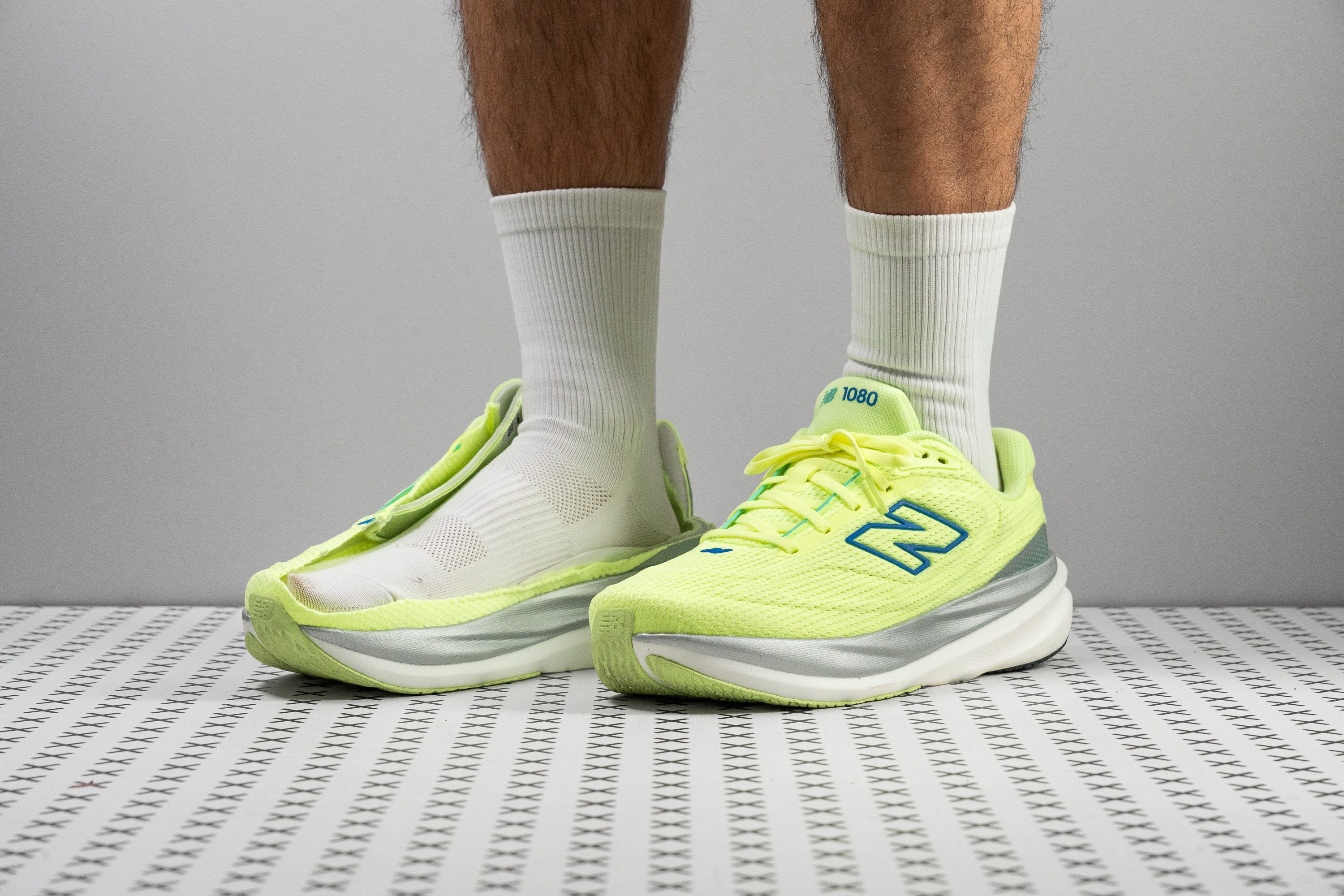
















































What makes it the best?
As we pushed the New Balance 1080 v15 to its limits in and out of the lab, it easily emerged as our top walking shoe from the brand. It gave an unparalleled experience and satisfied our craving for supreme comfort without the added weight and stiffness. With its breathable upper and pillowy cushion, standing all day is a breeze.
From the moment we set our foot into the shoe, we were blown away by its cloud-like touch. As we thoroughly tested it on the streets, it absorbed much of the impact, leaving us with fresh legs after a long day. To take a deeper look, we measured for shock absorption and confirmed our observation with 147 SA in the heel, emerging 13.1% more cushioned than average.
Another feature that makes it so comfortable is its free-flowing persona. Our scales show it’s only 9.0 oz (255g) light, far from a burden on foot. Moreover, our bend test shows it’s slightly more flexible than average (15.1N), further establishing that it’s highly suitable for walking.
We spent long hours in these shoes with no sweat or blisters, which was surprising since plush uppers tend to limit airflow. The knit upper feels luxuriously soft but defied all odds with a 4/5 score on our breathability test.
Unfortunately, its ultra-plush midsole feels wobbly at times. Those seeking more support should go for another pair.
Pros
- Exceptional plush comfort from top to bottom
- Long-awaited foam upgrade
- Noticeable weight reduction
- Reliable fit with multiple width options
- Dependable traction
- Feels more capable at faster paces
- Flexible and agile build
- Premium knit upper with strong airflow
- Superior reflective elements
Cons
- Slight price increase
- Ultra-plush foam will not suit everyone
- Limited stability
New Balance walking shoes with the best arch support
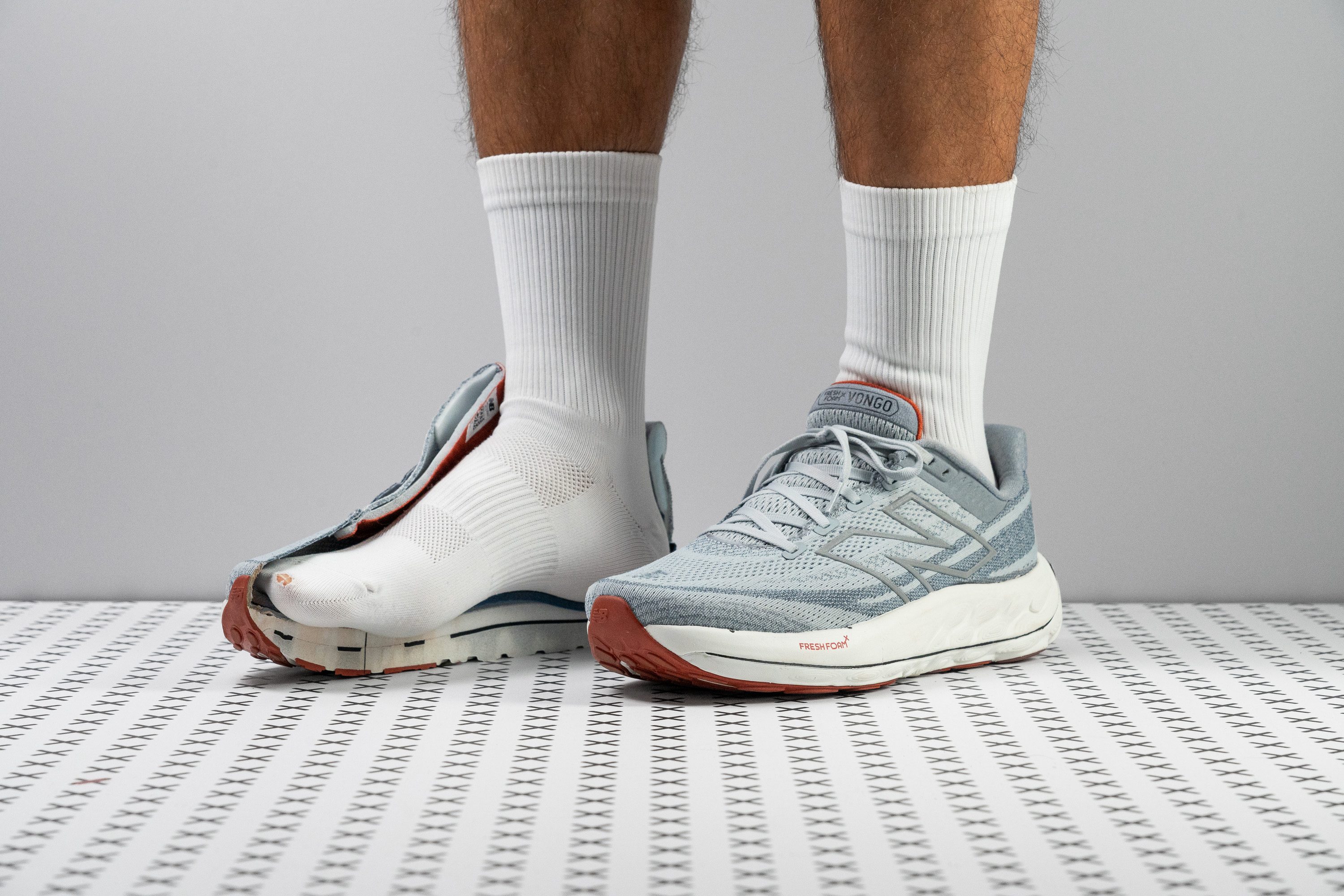




















































What makes it the best?
Based on extensive runs and intensive lab testing, the Fresh Foam X Vongo v6 is the New Balance walking shoe with the best arch support. It gave us confident and secure strides minus the stiff elements typically associated with stability shoes. Instead, it offers pure comfort and effortless movement.
Vongo v6 has a unique way of stabilizing the ride. Other than its dual-density foam, it has a plastic plate sandwiched in between. Our durometer shows the foam closer to our foot is a plush 15.8 HA for comfort, while the base layer is a firmer 18.9 HA for support. The EVA film plate nestled in between doesn’t add much stiffness to the shoe, proven by our bend test when it emerged more flexible than average by 20.6%.
As we logged longer walks, the midsole proved extremely comfortable. Our measurements reveal that Vongo v6 packs a lot of cushioning underneath for a stability shoe. It’s even taller than other neutral shoes at 36.1/30.5 mm.
However, this shoe is on the heavier side, weighing a hefty 11.0 oz (312g) build, so it may not suit those seeking a lightweight option.
Pros
- Flexible design
- Comfortable, high-quality upper
- Exceptional durability
- Perfect for easy paces
- Also suitable for neutral runners
- Excellent for long runs
- Reasonably priced
Cons
- Noticeably heavy
- Limited breathability
- Not the best for heel strikers
New Balance walking shoes with the best shock absorption
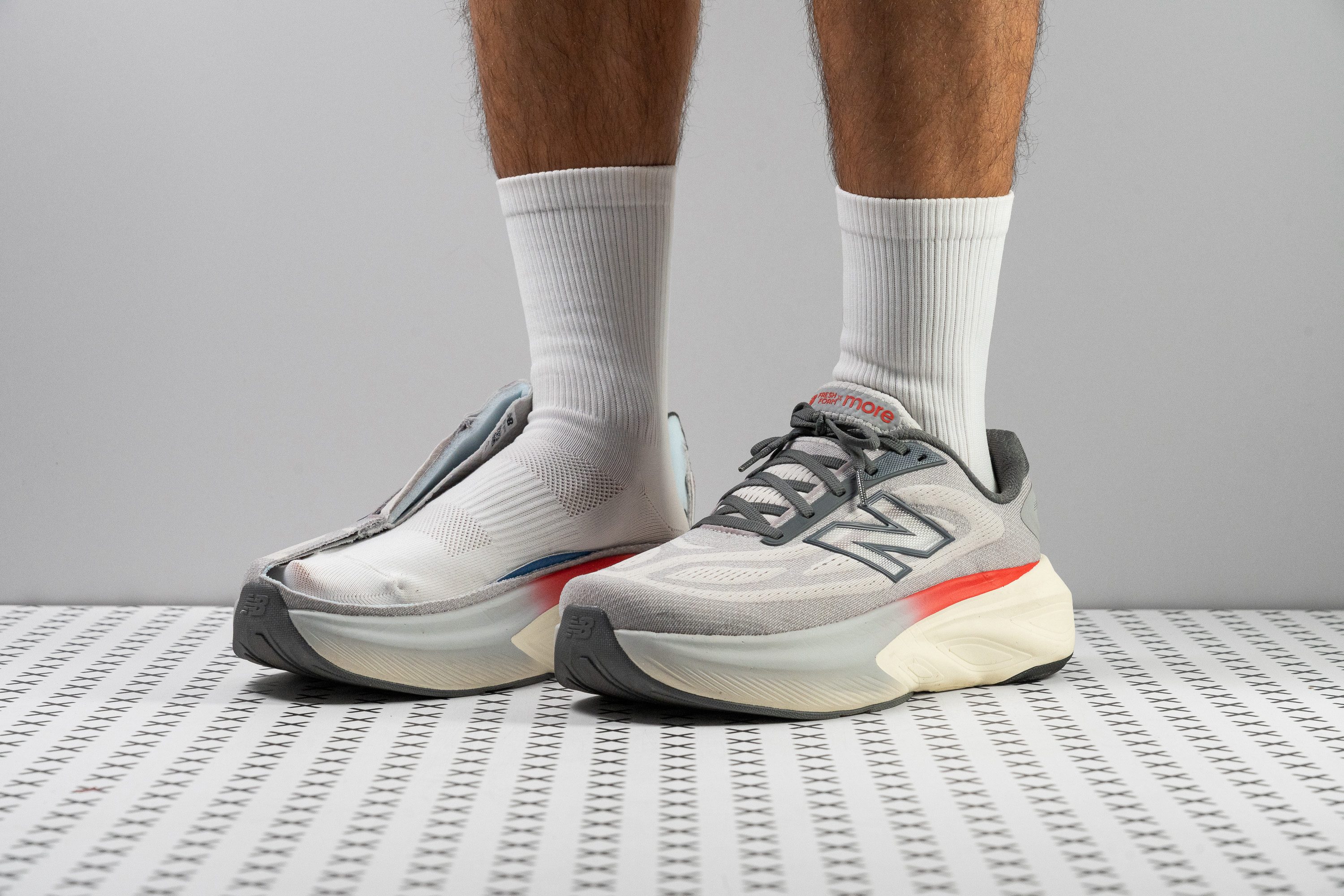













































What makes it the best?
The Fresh Foam X More v6 lives up to its name by offering bottomless cloud-like padding, gracing our walks with exceptional comfort. It truly offers the best shock absorption among New Balance walking shoes we’ve tried, and our lab agrees. Beyond comfort, it even offers a stable ride that can support tired or pronating feet.
The generous midsole of More v6 stands as one of the tallest and most protective from the brand. It features a massive 41.8 mm heel stack—7.2 mm above average—and wildly tall 38.5 mm forefoot—12.5 mm above average, clearly leading the pack in comfort. In our shock absorption test, it received high scores of 152 SA (heel) and 144 SA (forefoot), confirming the gentler landings we experienced, especially in the forefoot, which offers 37.1% less load on the legs than typical options.
Surprisingly, we never felt like toppling over despite its humongous stack. The midsole has a broad platform that gives us a confident, secure footing. At 122.5/102.0 mm, it’s one of the widest we’ve measured, naturally enhancing stability.
However, the big toe area is more tapered than average, which may feel restrictive for those with wider feet. For a more spacious fit, this model is available in wide and extra-wide options.
Pros
- Record-breaking shock absorption
- Wide platform ensures stability
- Super-plush foam
- Improved energy return
- Cozy upper
- No price hike this year
- Ideal for forefoot strikers
- Solid durability
- Semi-gusseted tongue for secure lockdown
- Good torsional flexibility despite its size
Cons
- Narrow, low-volume interior fit
- Still a heavy shoe
- Weak airflow
- Low drop doesn't work for everyone
New Balance walking shoes with the best comfort
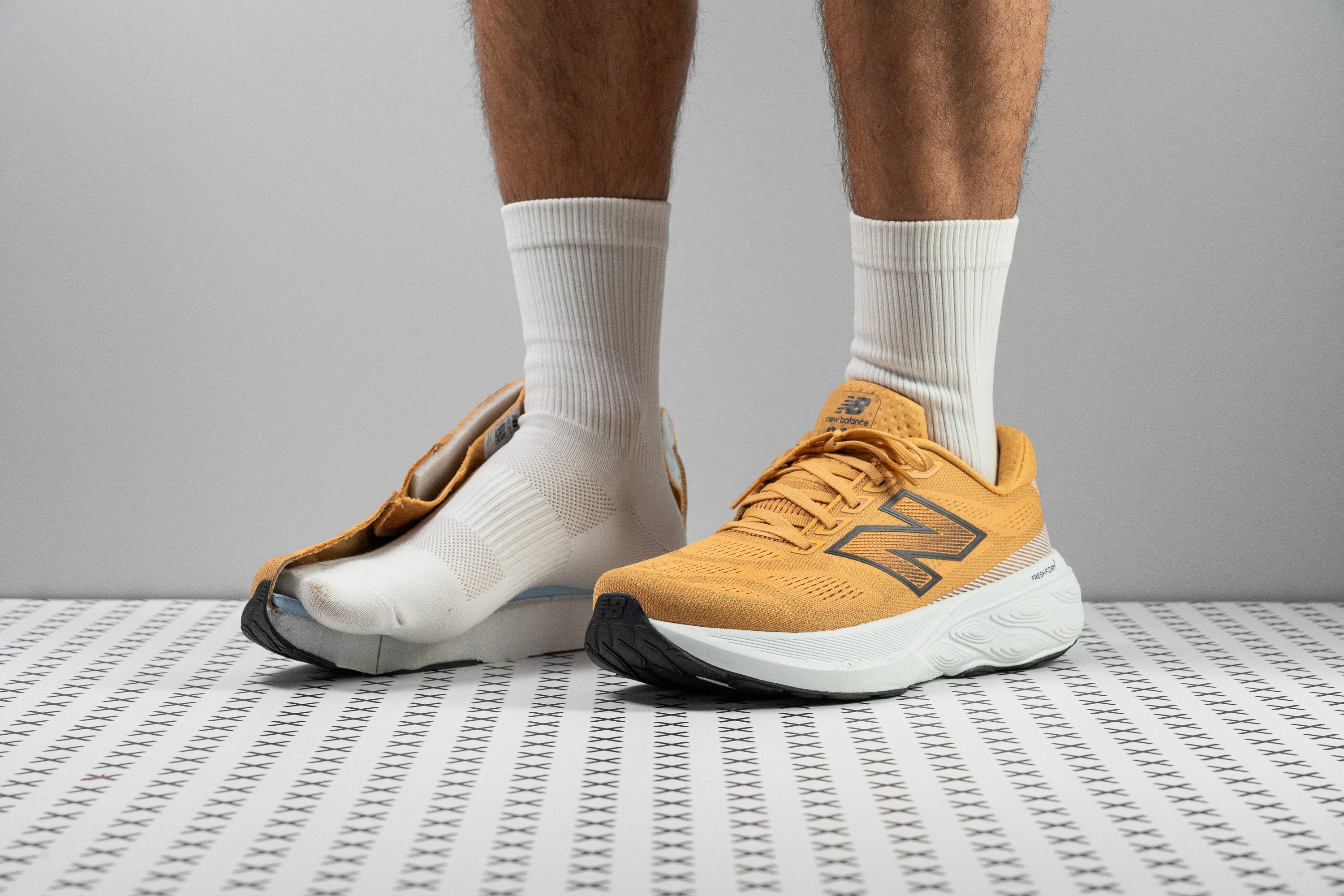













































What makes it the best?
The New Balance Fresh Foam X 880 v15 offers a smooth and seamless ride by driving us forward with its rocker geometry, enhancing a stable experience. It stood out in the lab with its ultra-thick forefoot and impressive joint protection, making it our most comfortable New Balance walking shoe.
Using our caliper, we measured generous cushioning of 39.7 mm in the heel and 35.4 mm in the forefoot, the latter being taller than the average heel stack in our roster! It erased the surface feel completely and took care of our legs during long hours on foot. In our shock absorption test, its forefoot impressed at 114 SA, 8.6% above average.
Though the platform runs tall, we didn’t feel like toppling over because of its high resistance to twisting and lateral movements. In our torsional rigidity test, it earned the maximum 5/5 rating. It also maintains a rocker structure that makes forward transitions feel effortless.
However, it has lots of exposed foam and minimal 1.9 mm rubber in the outsole, leaving us with durability concerns. Those seeking daily beaters should find a more long-lasting pair.
Pros
- Affordable max-stack option
- Secure and comfortable lockdown
- Rockered geometry
- Plush tongue enhances comfort
- No heel slippage whatsoever
- Amazing for long runs
- Durable yet comfy upper
- Fairly priced
- Stable ride
Cons
- Much heavier than previous version
- Not the best for walking or casual use
- Fresh Foam X feels firmer than expected
- Outsole durability is now a real concern
Best New Balance casual sneakers
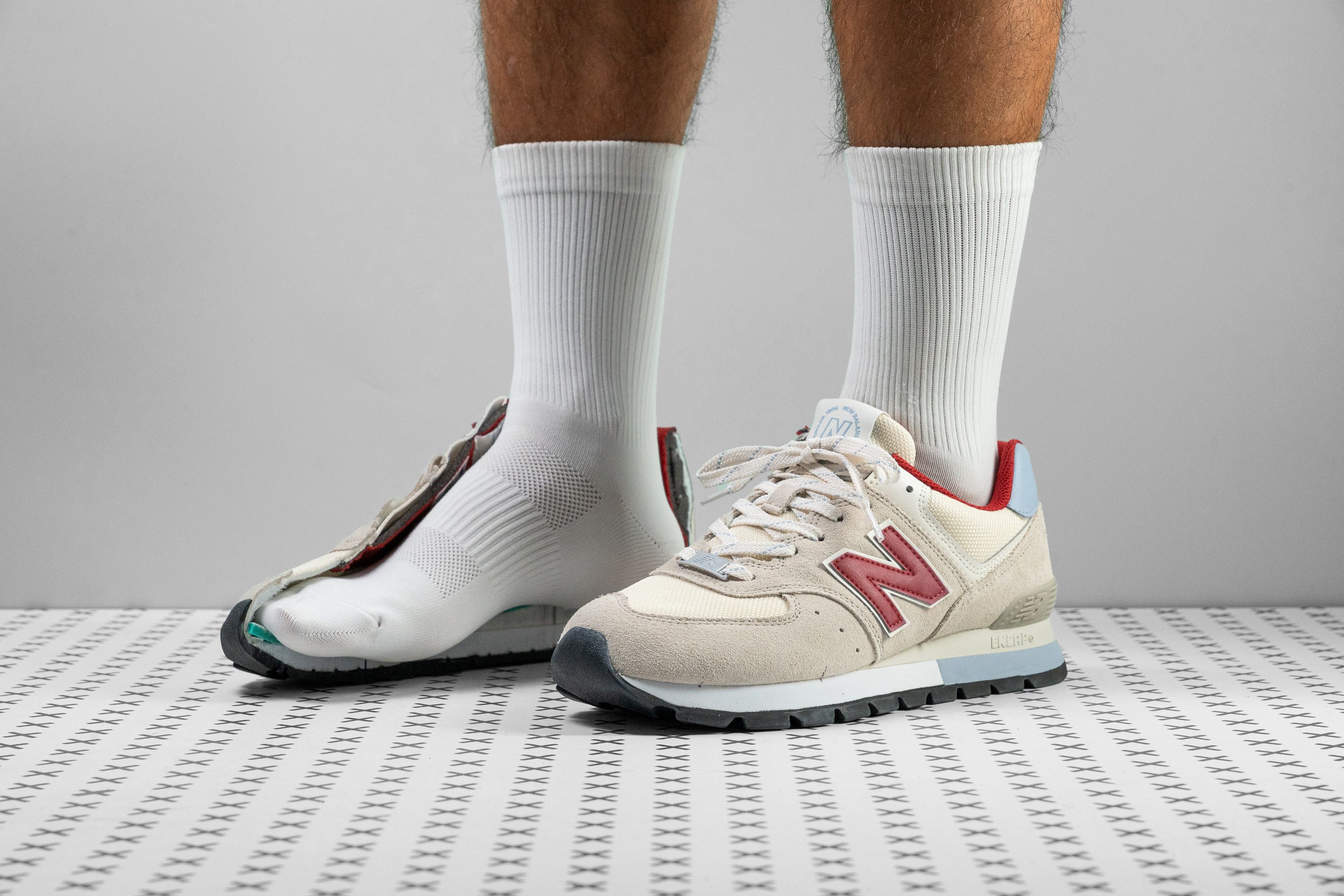
















































What makes it the best?
We could take the New Balance 574 for an entire day of foot travel without protest. It is a sneaker but walking in it encourages our optimal foot posture, lasting us hours and miles of stability and pleasure. Stepping things up is its modest price of $90, which is 23.1% more favorable than the average cost of walking shoes.
We cracked open the shoe and discovered two layers of foam. Both seemed unyielding and true enough, pressing our durometer to each revealed that the primary foam is 44 HA hard, while the secondary one is 33% softer than the former at 29.5 HA. While both are significantly firm, the combination afforded us impact protection and defense against foot collapsing.
Further proving the stability of the New Balance 574 is our caliper which measured the midsole widths of 114.3 mm in the forefoot and 80.2 mm in the heel. These values are broader than their averages by 8 mm and 2.5 mm, both of which exhibit a significant increase.
All day is not a long time in 574 but one thing that might change our minds is the lackluster air circulation. Earning a 3/5 breathability rating in our smoke test, 574 is not the best during sun-drenched trips. We recommend wearing more breathable pairs in warm weather.
Pros
- Classic NB silhouette
- Budget-friendly
- Suitable for all-day wear
- Real suede
- Highly durable
- Stable and supportive
- Easy to style
- Numerous color options
- Excellent grip on dry and wet
Cons
- Lacks breathability
- Stiff and firm platform
- Tongue shifts a little
Best retro New Balance walking shoes
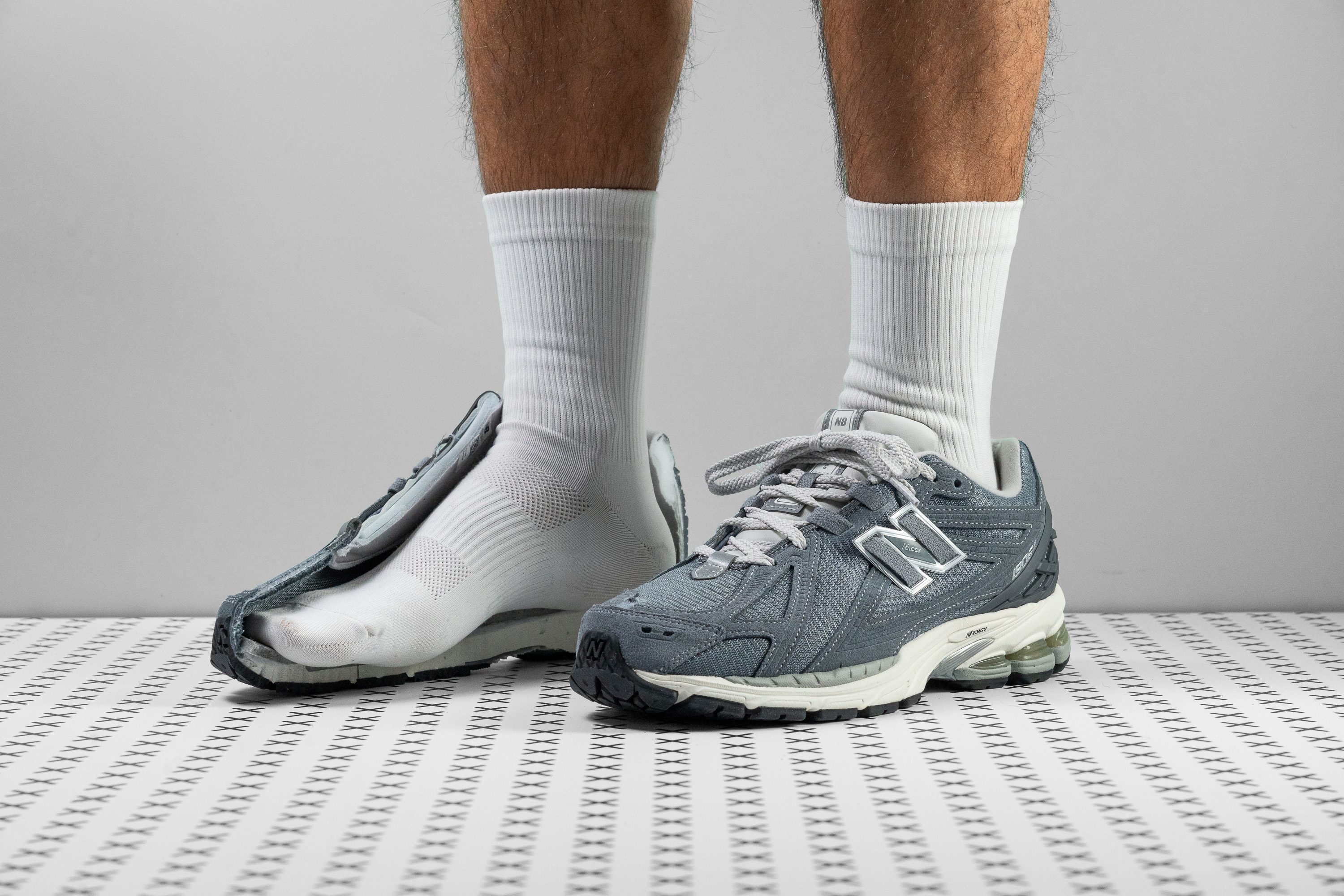






















































What makes it the best?
During our tests, we found that the New Balance 1906R packs comfort, durability, and premium quality into one stylish kick. This dad shoe cradled our feet during long hours of standing, making it our ultimate retro sneaker among New Balance walking shoes tested in the lab.
The upper is not only visually appealing but it’s also made with superior craftsmanship. Testing in the lab, our butane torch reveals the overlays are made of real suede. Meanwhile, it exhibited remarkable wear resistance against our Dremel, earning a solid 4/5 durability score.
Even underfoot, the Ndurance rubber shows promising signs of strength in the lab. Our durometer shows a high 90.3 HC measurement, 5.9% above average. Meanwhile, it measures a thick 6.0 mm, erasing any doubts about longevity.
We discovered in the lab that 1906R uses running-inspired technologies to deliver solid support and comfort. We felt like we could walk all day in this pair that measures 37.1/25.6 mm in the heel and forefoot, both above average. Meanwhile, each landing feels so gentle thanks to the ABZORB SBS units in the heel.
However, the extra durability and cushioning come with a weight penalty. At 14.1 oz (401g), 1906R will feel clunky to those who prefer lightweight sneakers.
Pros
- Fabulous comfort for all-day wear
- Exceptionally breathable
- Appealing throwback style
- Premium quality and real suede
- Highly durable upper and outsole
- Very comfortable in-shoe feel
- True to size and fit
- Great traction on dry and wet
Cons
- A bit heavier than average
- Pricier than average
Best budget New Balance walking shoes
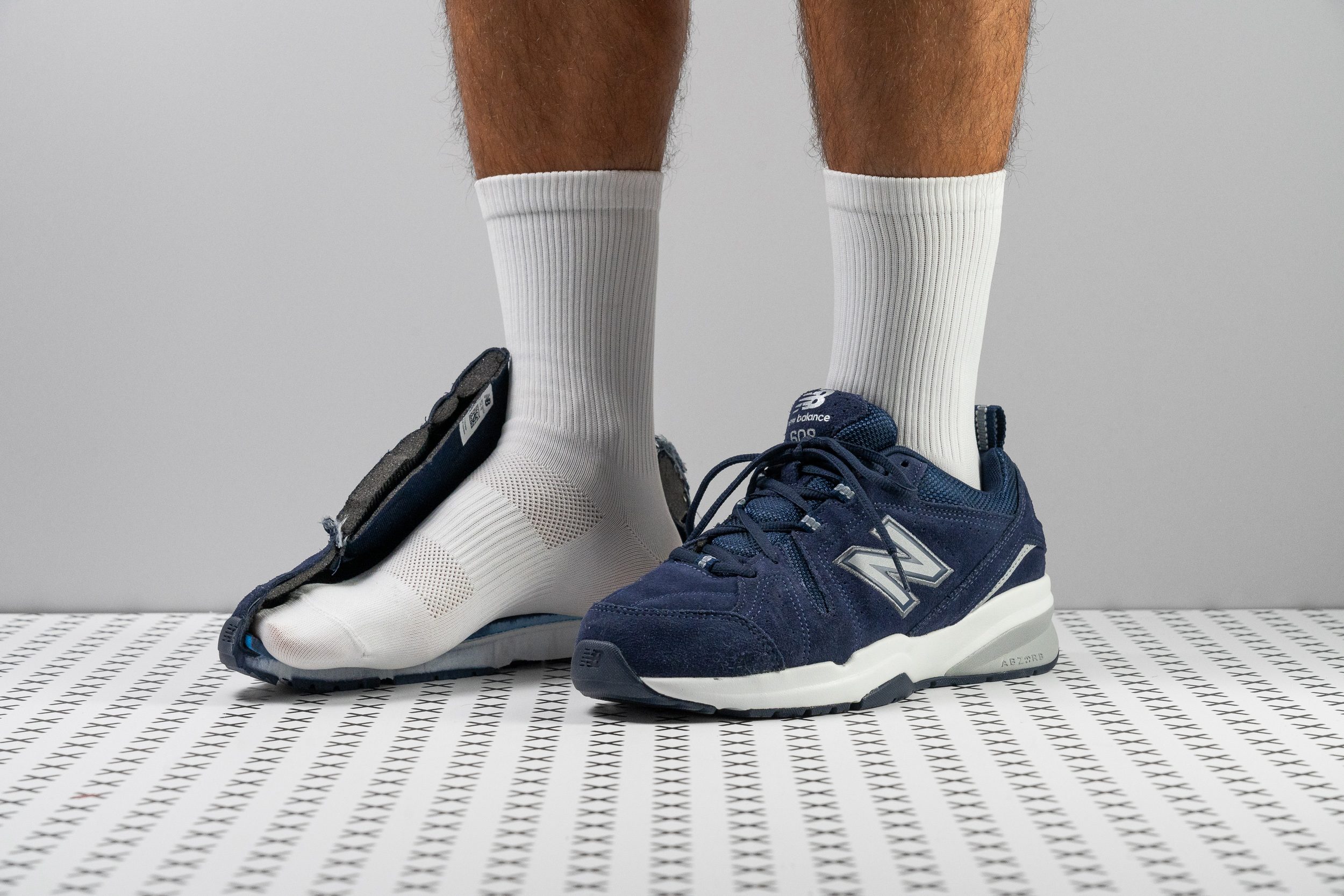

























































What makes it the best?
The New Balance 608 v5 was such a pleasure to test on foot with its flowy build, protective cushioning, and stable ride. Our lab tests confirm its versatility and reliability for its $70 price, making it our top budget New Balance walking shoe—especially since the category average is $119.
Easy on the wallet and easy on the feet, 608 v5 delivers smooth transitions and effortless strides with its flexible build. It barely resists our movements and got an average result of 14.2N in our bend test, making it comfortable for prolonged wear and other daily activities.
Even with its accessible price, it doesn’t fall short on cushioning. Despite having a moderate 31.7/22.1 mm stack, the foam still has that heavenly touch with its above-average 116 SA result in our shock absorption test.
608 v5 feels highly supportive during our walks, which helps prevent leg fatigue. In our manual twist test, we rated it with a solid 4/5 torsional rigidity score, proving it won’t let ankle twists happen.
Unfortunately, the shoe has limited ventilation, which may lead to sweat and body heat build-up. We recommend using this pair during cooler seasons.
Pros
- Comfortable and well-padded
- Wonderfully balanced cushioning
- Durable upper materials
- Soft and supportive insole
- Great traction on dry and wet
- Dad-shoe vibes
- Available in 3 widths
- Nice value for money
Cons
- On the heavier side
- Might rub on your heel
Choose the best cushioning in NB walking shoes
If you are looking for an ultra-plush experience that makes you feel like walking on marshmallows, look out for New Balance shoes with Fresh Foam and FuelCell foams.
Originally designed for the brand’s running shoes, these cushioning technologies offer an extraordinary level of shock absorption. We bet that someone who spends all day on their feet could use some of that impact protection as well.
We take all New Balance shoes through a scientifically acclaimed shock absorption test to measure how much impact protection you can expect from a given model. The higher the SA, the better the cushioning, and all shoes above 110 SA provide great comfort for all-day wear.
Both Fresh Foam and FuelCell also stand out with their amazing plushness. Based on our Shore A durometer measurements, the average midsole softness of a New Balance shoe with Fresh Foam is 15 HA.
Example of a New Balance walking shoe with Fresh Foam
The FuelCell foam proved to be even softer with a very low reading of 10 HA! For reference, the average midsole softness across all walking shoes in our lab is 25 HA.
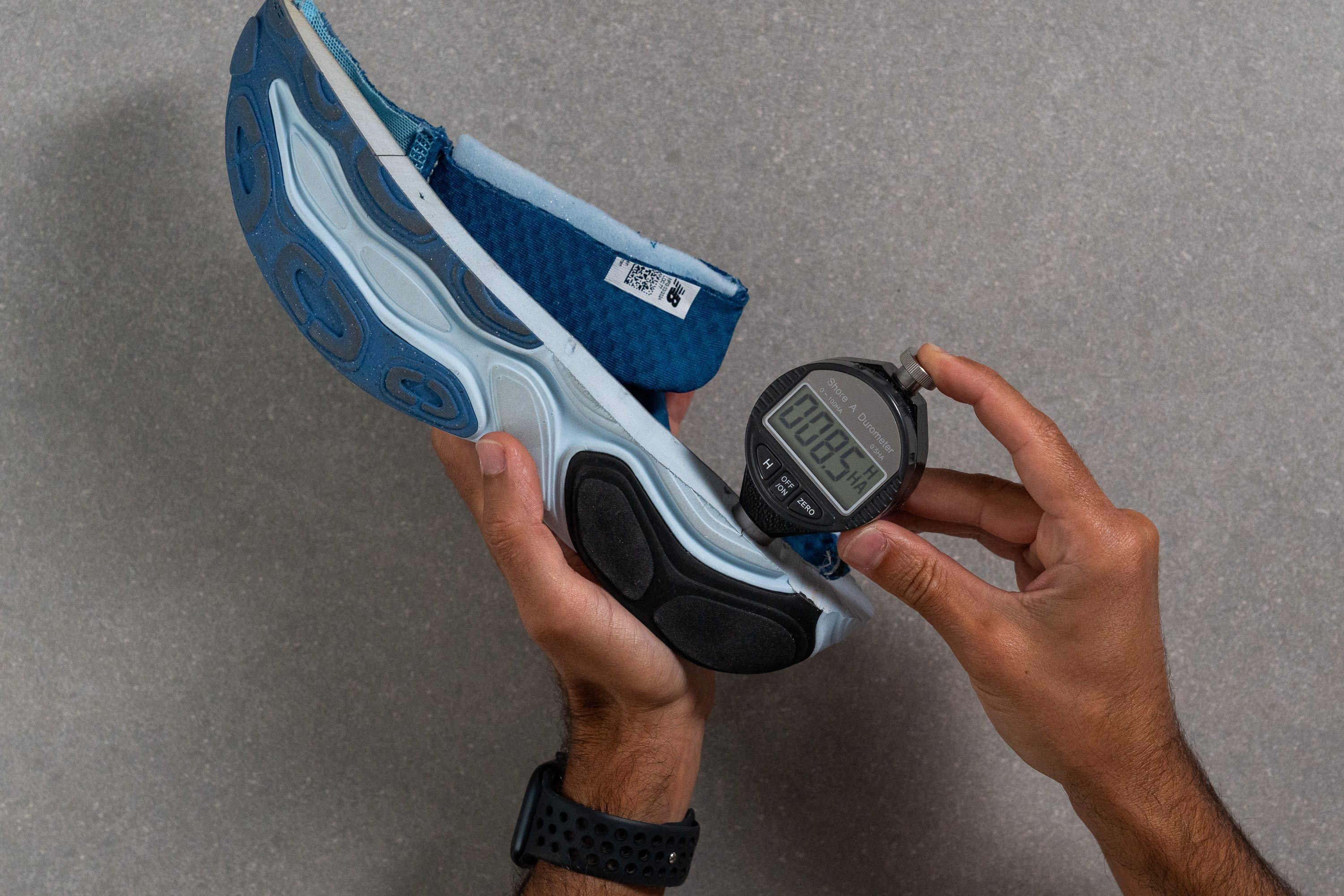
| HA durometer reading | Softer than average by % | |
| New Balance Fresh Foam | 15 HA | 67% |
| New Balance FuelCell | 10 HA | 150% |
| Average of all walking shoes | 25 HA | - |
Because Fresh Foam has been around longer, it is more commonly present in NB walking shoes than the FuelCell. The latter is also considered more of a premium foam, which is reflected in the price of shoes using it. Meanwhile, Fresh Foam can be found in a wide range of shoes with a price tag varying from $75 to $165.
Please keep in mind that neither Fresh Foam nor FuelCell are going to feel exactly the same in different NB shoes. Factors like stack height, other midsole components, the shoe’s overall geometry, etc. affect the way these foams feel in a given shoe.
The table below shows the varying midsole softness and stack heights in New Balance walking shoes. It is now up to you to decide how much plushness and ground feel you want to experience underfoot.
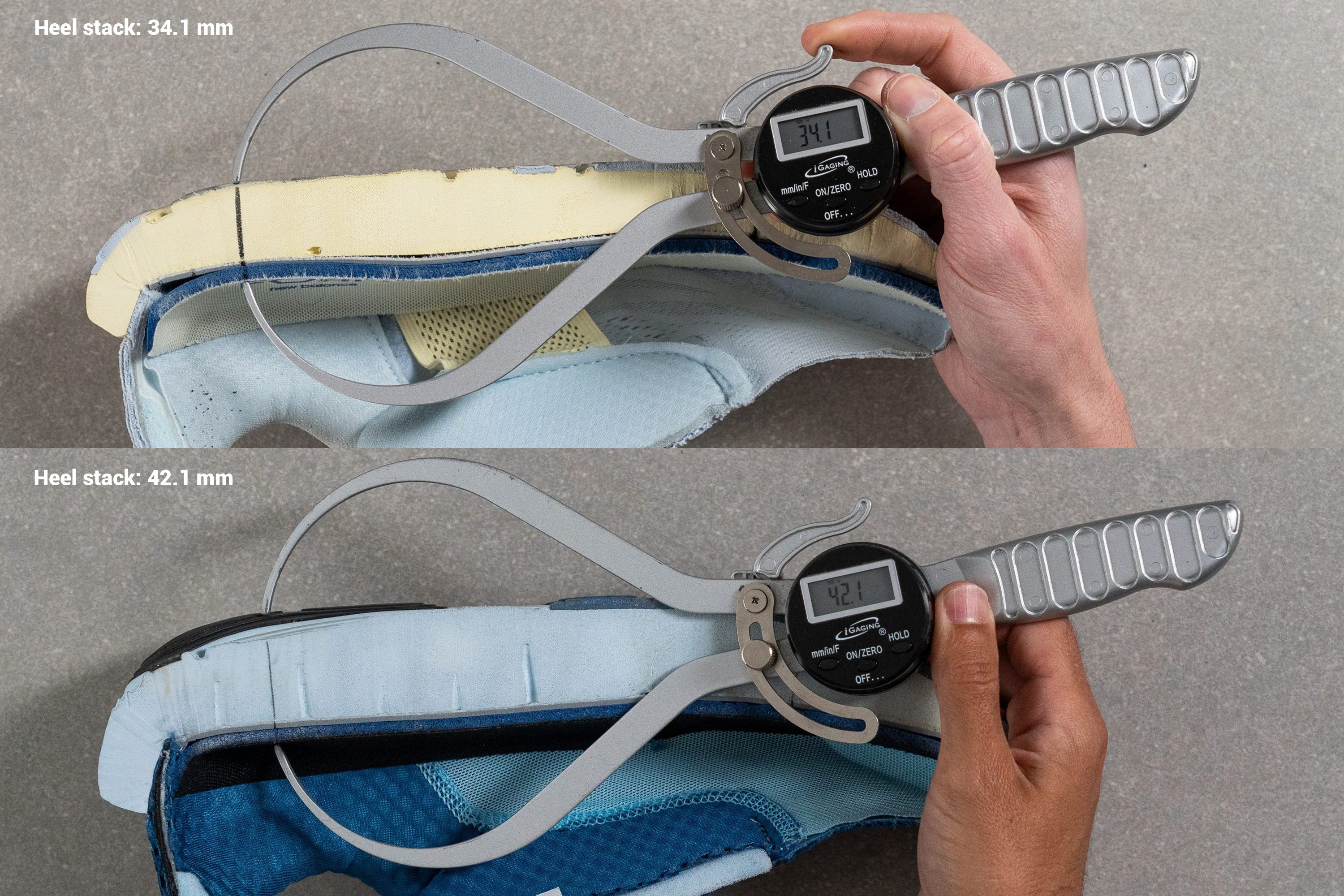
New Balance shoes for flat feet, overpronation, and plantar fasciitis
If you have a proven case of flat feet, complemented by a noticeable inward rolling of the foot (see image below), or a painful condition known as plantar fasciitis, we highly recommend that you consider more supportive walking shoes from New Balance.
If in doubt, see the illustration below to guide you. You can also learn more about pronation and arch support in our in-depth research on the topic.
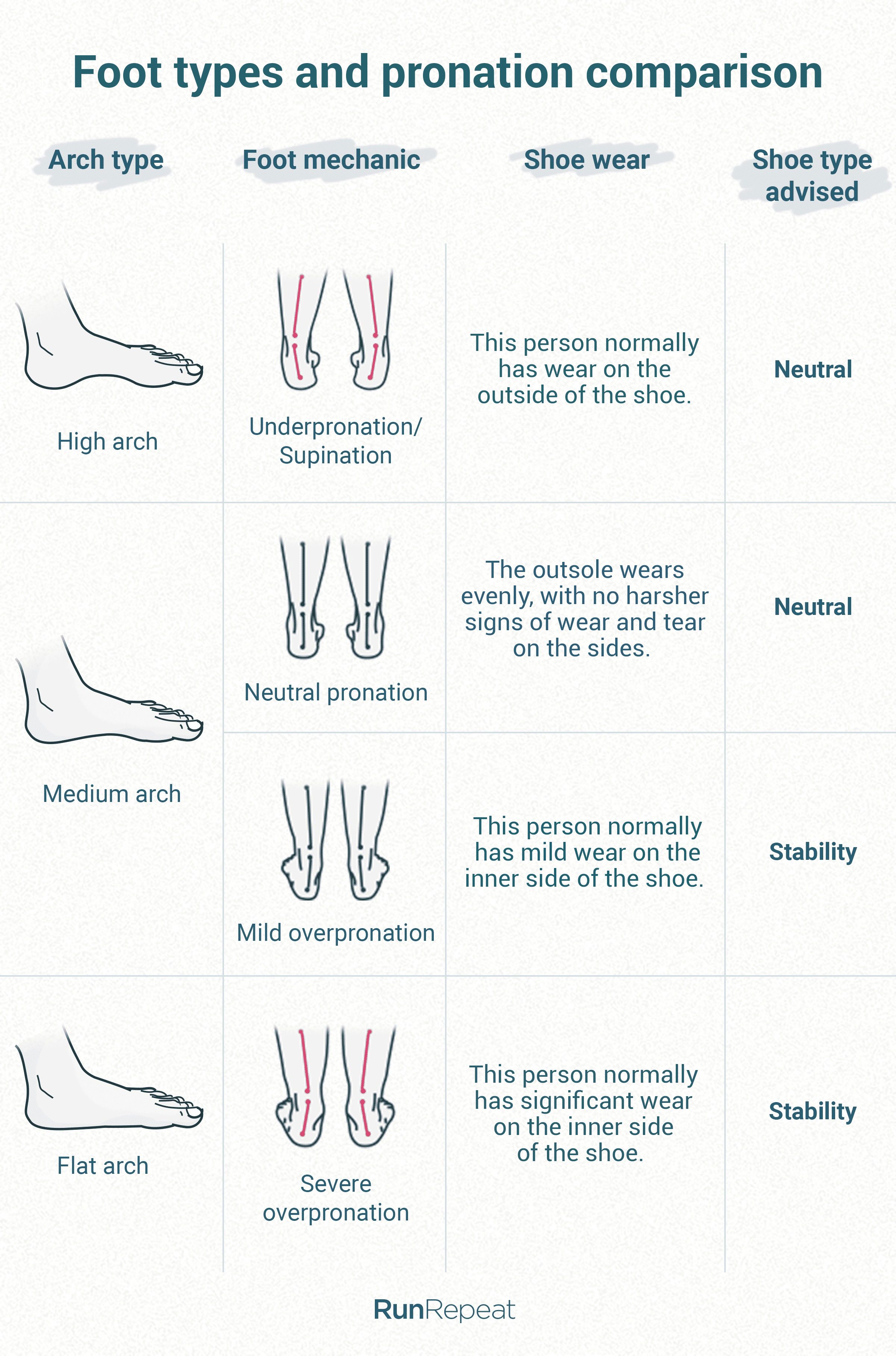
New Balance shoes for flat feet and overpronation
As a footwear company that started off making arch supports, New Balance has accumulated a lot of expertise in this field. You can experience the brand’s practices by choosing shoes marked as stability or motion control. In the past, motion control was associated with a higher level of support but these days, the difference is blurred and both terms are used interchangeably.
Example of a New Balance walking shoe with arch support
The most supportive shoes from New Balance will meet the following criteria:
- Additional stability and arch support elements (i.e. a Stability Plane, a TPU shank, a dual-density midsole, or a Rollbar) that prevent the foot from collapsing inwards.
- High torsional rigidity that doesn’t let the shoe twist so easily.
- Stiff and well-padded heel counter that prevents the heel from sliding sideways.
- Wide platform that creates a large landing area to prevent the foot from spiling.
Here is an overview of stability/motion control New Balance shoes which have all of the features listed above:
For more options, take a look at our guide on walking shoes for flat feet.
New Balance walking shoes for plantar fasciitis
Supportive New Balance shoes also have the potential to relieve discomfort associated with plantar fasciitis (PF) - inflammation of the fascia that connects heels to toes.
You don’t necessarily need arch support for this condition unless you also have flat feet and overpronation but here is what you must look for in a shoe that’s suitable for plantar fasciitis:
- Well-cushioned platform: There should be at least 100 SA of shock absorption in the heel to keep the inflamed area buffered from the hard ground.
- Elevated heel: The heel-to-toe drop should be at least 8 mm high, as it doesn’t activate foot muscles as much as low-drop shoes do.
- High torsional rigidity: A shoe that’s too flexible can trigger the condition so you want a stiffer and more supportive platform to minimize foot twisting and wobbling.
- Stiff and well-padded heel counter: a solid heel hold makes sure that the heel doesn’t work overtime and that the load is evenly distributed throughout the entire foot.
Example of a NB walking shoe for plantar fasciitis (demonstration of a stiff heel counter)
How to get the right size and fit in NB walking shoes
New Balance shoes, in general, have a very positive reputation for running true to size and fitting as expected. Here are a few tips to help you make sure that you’re getting the best possible fit in your future NB pair.
Size
New Balance has a rather straightforward sizing scheme with 5-mm intervals between half sizes and 10 mm between full sizes.
Knowing your precise foot length will help you navigate the brand’s sizes easily. Say you are a male who measured your foot length at 264 mm. Because you need about a thumbnail’s width of space between your longest toe and the shoe’s upper, New Balance’s size chart shows that a foot length of 264 mm corresponds to 270 mm of shoe length in Mondopoint (CM/JP), which in turn equates to men’s US size 9.
Fit
People with narrower or wider than average feet can always rely on New Balance for alternative width options. The brand’s width options for walking shoes range from Extra-Narrow (2A) to Extra-Wide (6E)!
According to the brand’s width chart, there is a 3-4 mm difference between New Balance widths. However, when it comes to the regular width, different models offer different widths due to the difference in design. Some toeboxes are more pointy and others are rounder.
To get the exact measurements of the toebox, we pour a gel into the New Balance walking shoe and then freeze it. Once it's set, we have a gel mold that perfectly resembles the interior of the toebox
When the gel mold is ready, we take our digital caliper and start measuring!
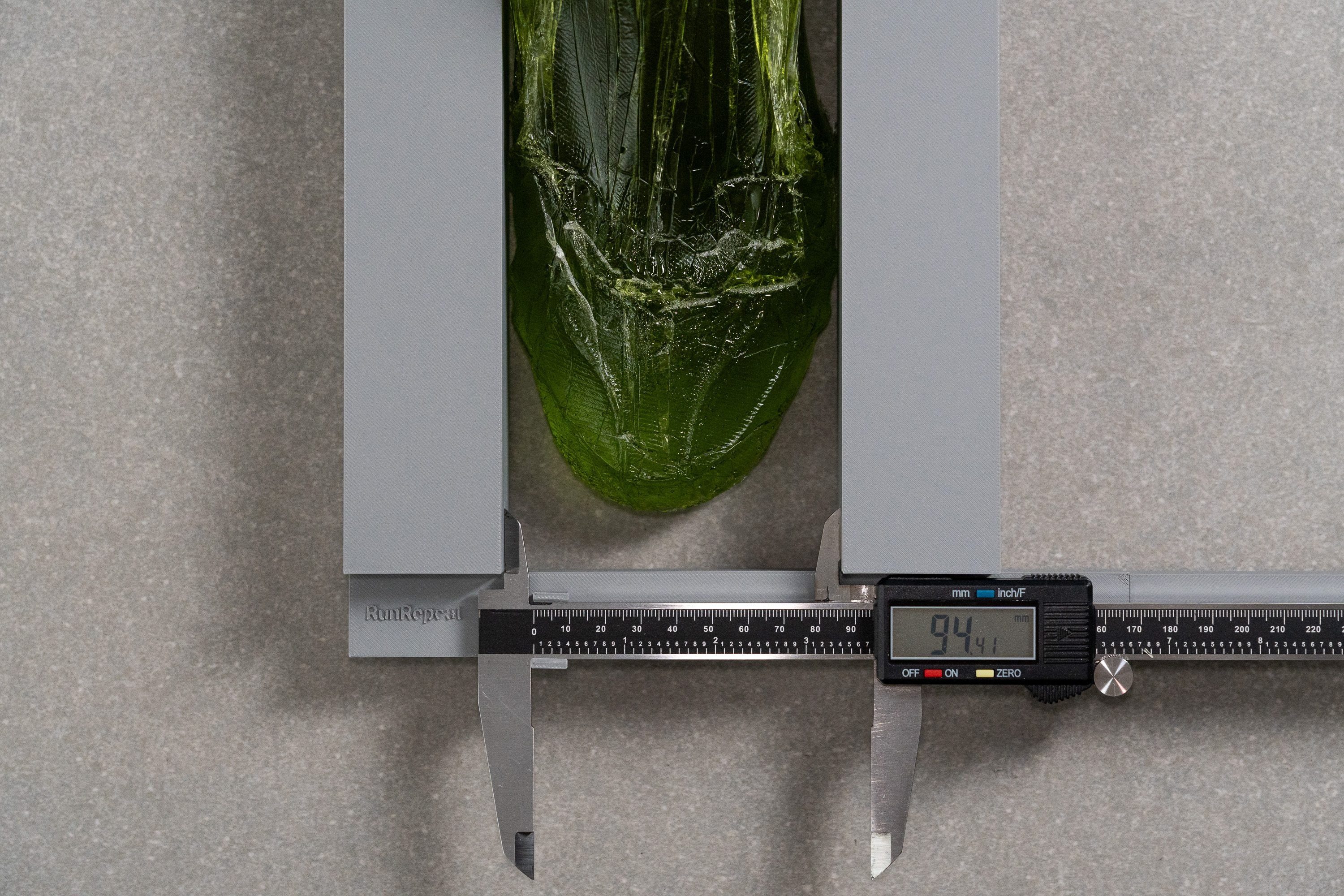
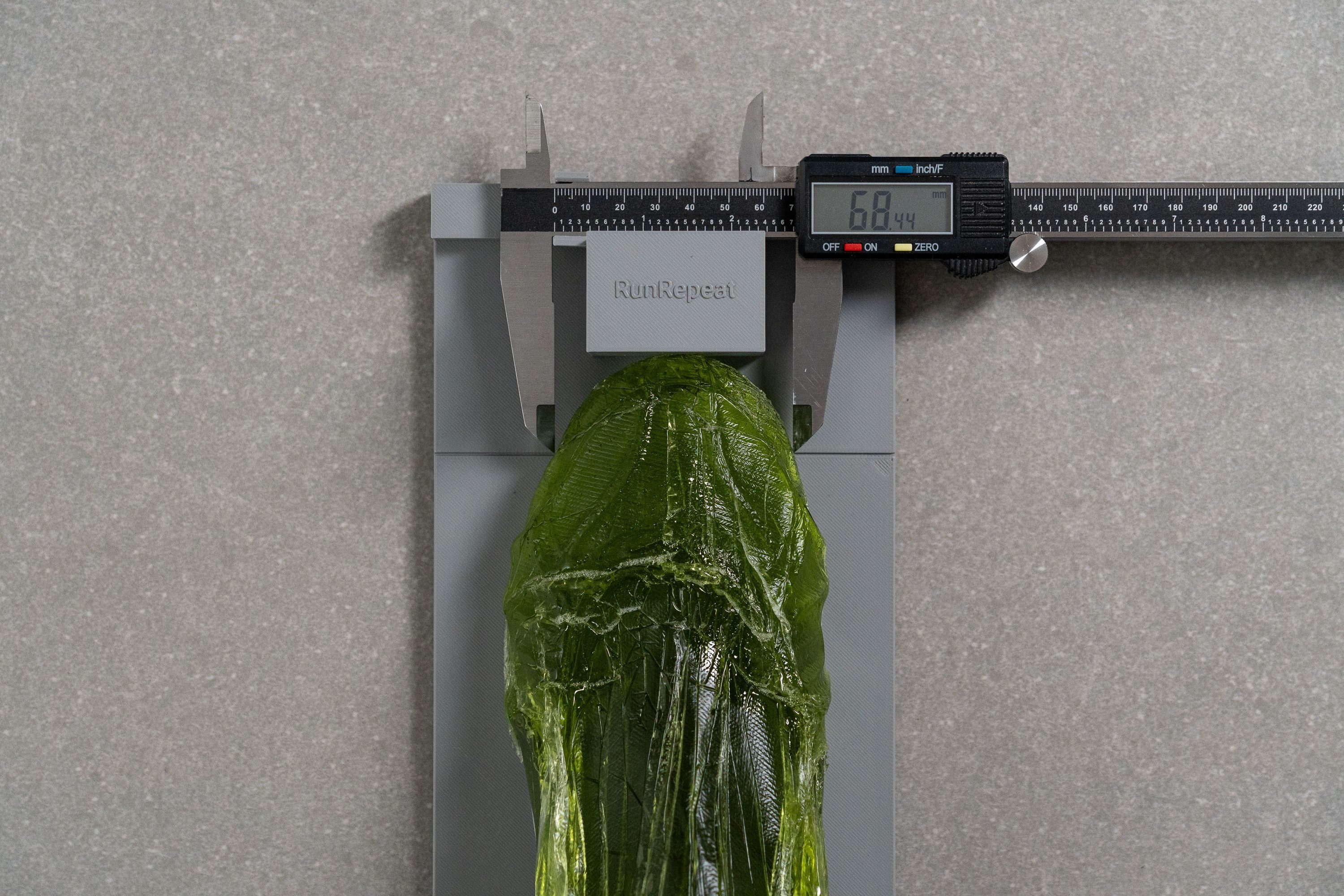
Knowing these 2 measurements is perfect because you can easily find New Balance walking shoes that offer more or less room in both places, depending on the shape of your own feet and toes!
For those who often feel pressure from the top in the toebox, we also measure its height! We cut our gel mold in half and, again, use a digital caliper.
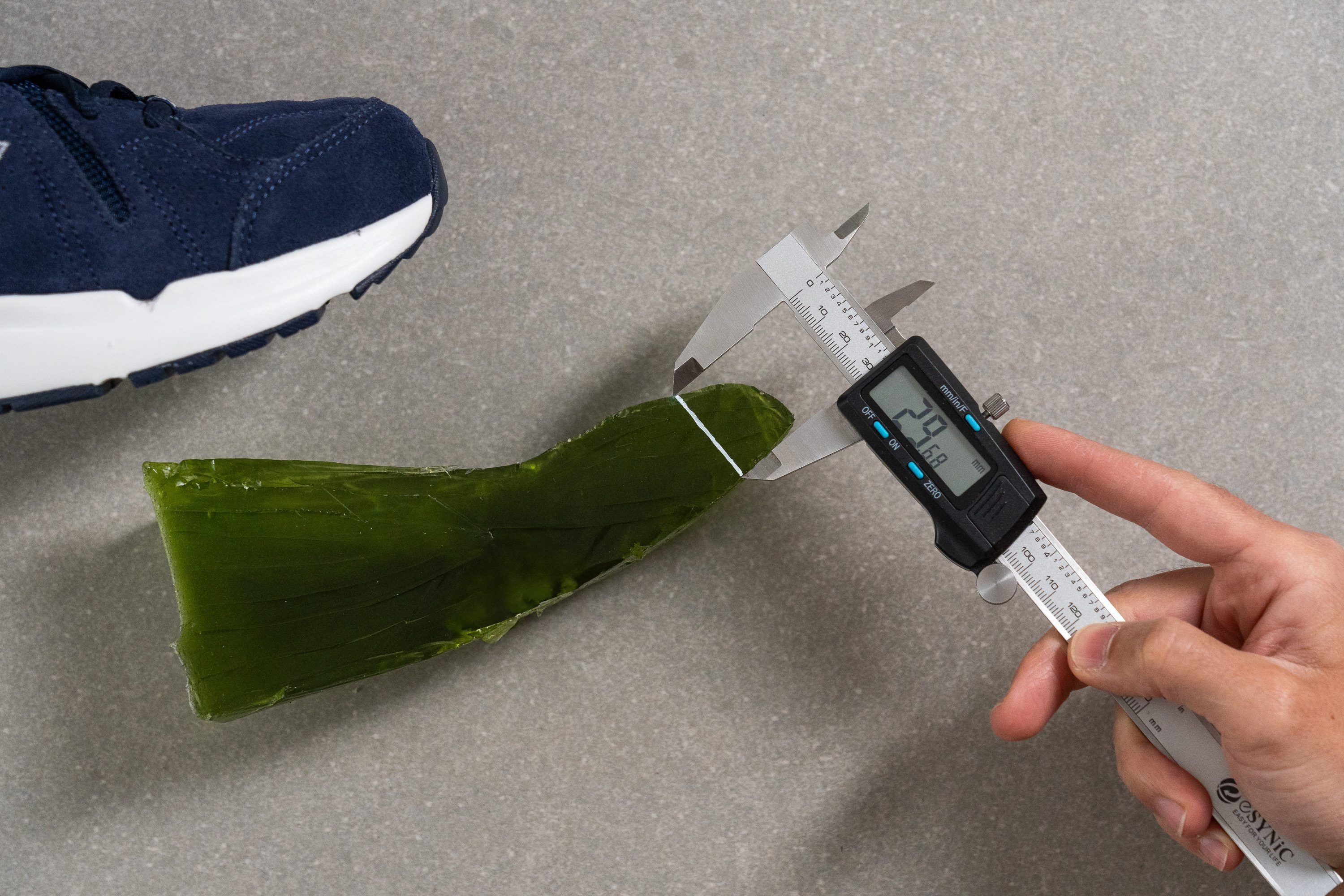
Higher toeboxes in walking shes are better for those who often experience black toenails.
Consider breathability and season
Going into a sweltering summer season, your future NB shoes must provide enough breathability to handle the heat. That’s why we perform several ventilation tests on every shoe in our lab.
Having pumped smoke into each shoe, examined its ventilation pores over the light, and even investigated its mesh structure under a microscope, we rated each New Balance walking shoe with a breathability score from 1 to 5.
Here is an overview of the most breathable New Balance shoes.
If, on the other hand, you need a shoe for the colder months, you can opt for a New Balance shoe with a lower breathability score or simply wear a thicker sock with a breathable one.
New Balance doesn’t offer any waterproof walking shoes but there are options with leather uppers that have some inherent water resistance.
Don’t overlook durability (New Balance shoes hardly ever disappoint)
Paying $140 or even $170 for a pair of walking shoes, you surely expect them to last you a good while. More than a season for sure.
We perform several demanding durability tests in our lab to put each New Balance shoe through its paces.
We drill various parts of the shoe with sandpaper and assess their abrasion resistance based on the amount of damage.
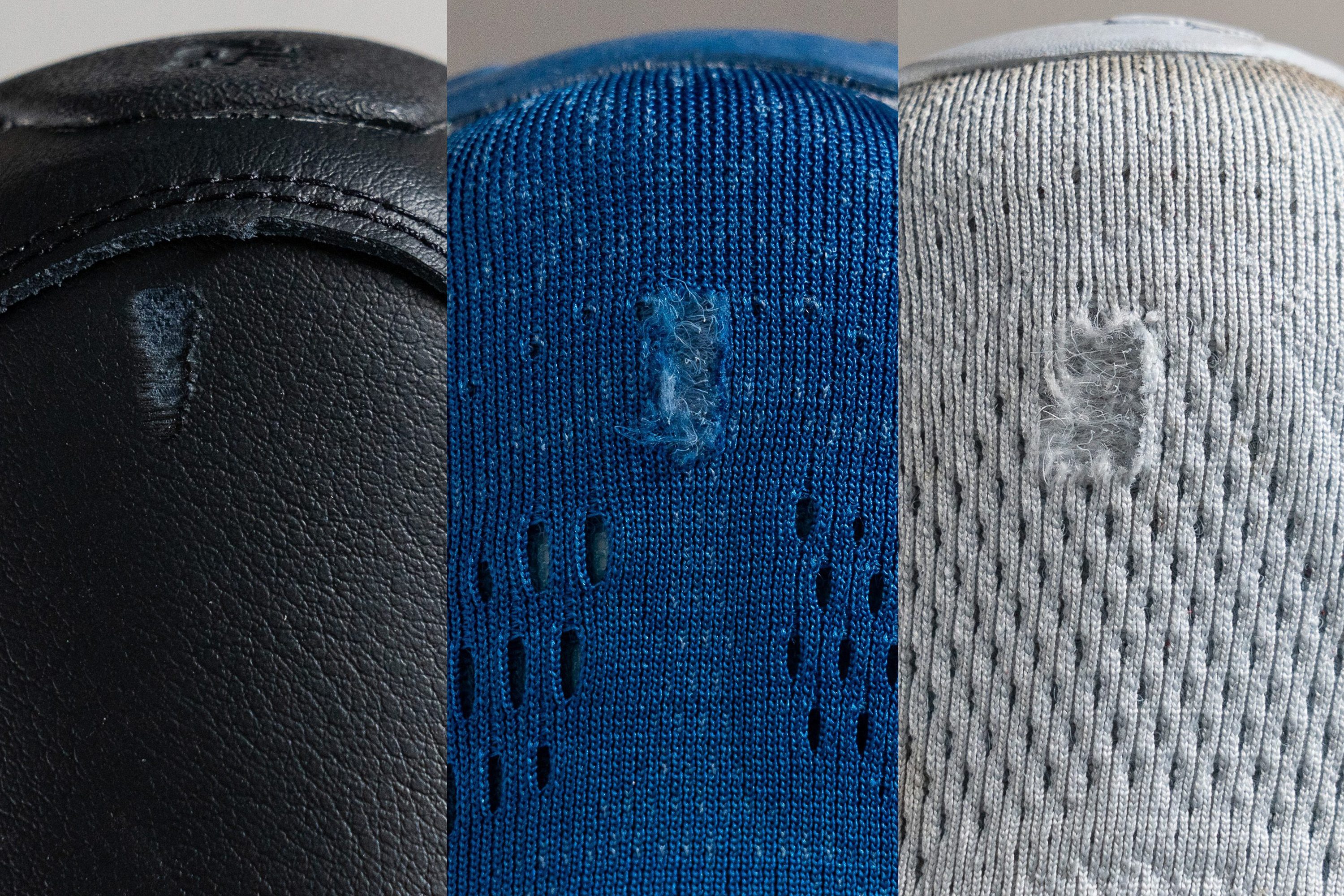
Some NB shoes are sturdy and durable overall while others have strong rubber outsoles but frail uppers, or vice versa. In the table below, we gathered the most hard-wearing New Balance walking shoes we’ve tested.
Curious observation: a cheaper shoe doesn’t always mean poorer durability.
*Toebox and heel padding durability are given a score from 1 to 5 where 5 is the most durable. Outsole durability shows the depth of the dent - the smaller the number, the stronger the rubber.
A few more things to consider when it comes to shoe durability:
- Look for a particularly durable heel padding/lining if you have overpronation, foot deformities, or if you tend to tear holes inside your shoes quickly.
- Choose shoes with more rubber/less exposed foam if you spend a lot of time on concrete, cobblestone, or other abrasive surfaces. A full-length rubber outsole is the most optimal in this case.
Are lifestyle New Balance sneakers good for walking?
Some of them, yes.
In general, the brand’s casual sneakers lack the same advanced cushioning technologies as its walking and running footwear. But it doesn’t mean that they aren’t comfortable enough for day-to-day use.
In most cases, these are just retro versions of NB’s running shoes of the past.
Having put dozens of New Balance sneakers through our rigorous testing process, we have filtered out the most cushioned, padded, and supportive options for walking and standing all day.

